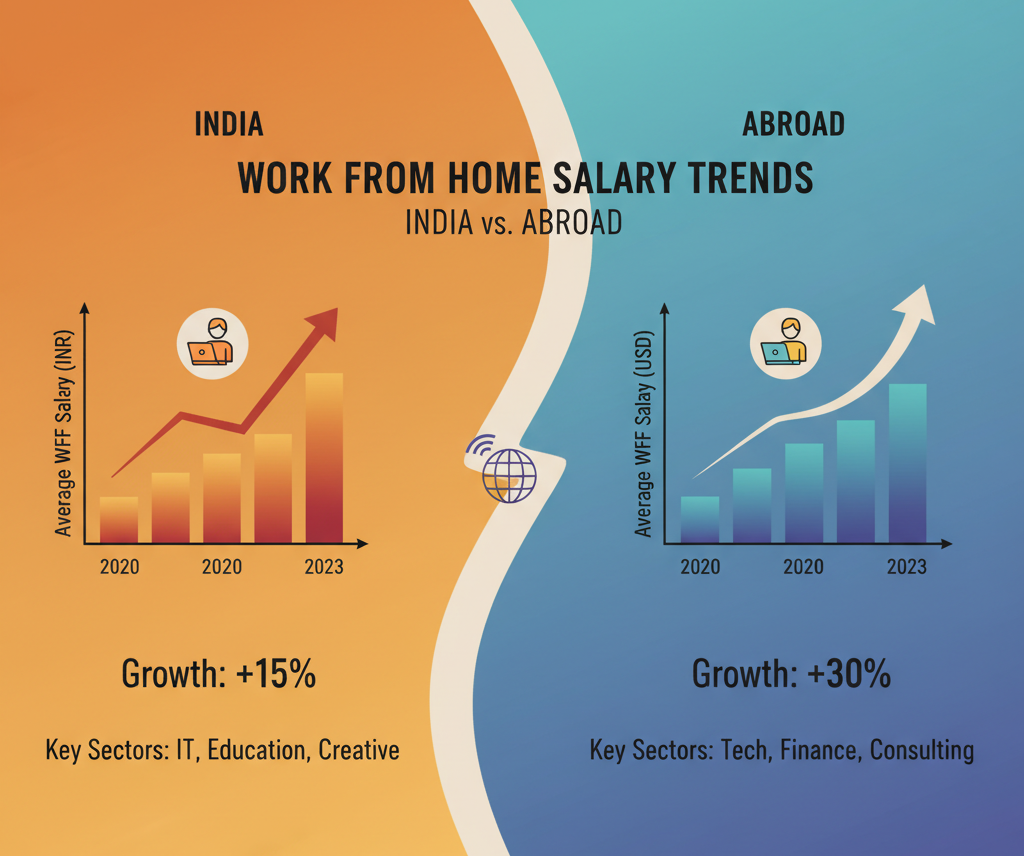Introduction
The shift to remote work has transformed the global employment landscape, creating new opportunities and challenges for professionals worldwide. With the rise of digital tools and flexible work policies, more employees are exploring work-from-home (WFH) roles. Work From Home Salary Trends One of the most debated topics in this trend is salary. How much does a WFH professional earn in India compared to their counterparts abroad?
Salary trends are influenced by factors like industry, experience, cost of living, and company policies. While India offers a growing remote job market with competitive pay in tech, marketing, and design sectors, countries like the United States, Germany, and Australia often provide higher salaries but also higher living costs. Understanding these trends is crucial for professionals considering remote work, whether they plan to work for local firms, global companies, or freelance internationally. This blog dives deep into WFH salary trends, highlighting comparisons, benefits, and practical insights for job seekers.
India’s Work From Home Salary Landscape
India’s remote work ecosystem has expanded rapidly in recent years. Tech companies, startups, and digital marketing agencies are leading the charge in offering remote positions. Salaries for Indian WFH employees vary widely depending on roles, with software developers, data analysts, and cloud specialists often topping the charts.
For instance, an entry-level software developer working remotely in India can earn between ₹3 lakh to ₹6 lakh annually, while experienced developers may earn ₹12 lakh or more. Roles in digital marketing, content writing, and graphic design typically offer ₹2 lakh to ₹8 lakh, depending on skills and expertise. Indian professionals benefit from lower living costs compared to Western countries, allowing even moderate salaries to provide a comfortable lifestyle.
Moreover, Indian companies increasingly offer perks like flexibleWork From Home Salary Trends hours, skill development allowances, and home office stipends. This growing support enhances the attractiveness of WFH jobs, particularly for millennials and Gen Z professionals who prioritize flexibility over traditional office setups.
Remote Work Salaries Abroad
In contrast, international remote work salaries often reflect higher costs of living and labor market standards. Countries like the United States, Canada, Germany, and Australia have set benchmarks that are significantly higher than those in India.
For example, a remote software engineer in the U.S. may earn between $80,000 to $150,000 annually. Similarly, digital marketers and content creators working remotely for European companies can earn $50,000 to $90,000 per year. These figures are influenced by factors such as experience, job complexity, and company size.
However, the higher salaries abroad come with responsibilities like higher taxes, healthcare contributions, and occasional mandatory on-site visits. Many professionals weigh these factors against the benefits of WFH flexibility. Additionally, companies abroad are increasingly open to hiring international talent at competitive rates, creating opportunities for Indian professionals to work remotely for global firms while earning higher pay than domestic positions.
Key Factors Influencing Salary Differences
Several factors explain the salary gap between India and other countries in WFH roles. First, cost of living is a primary driver. Higher living expenses in the U.S., Europe, and Australia translate to higher salaries. Second, industry demand affects pay scales. Tech, finance, and specialized consulting jobs often pay more than administrative or creative roles.
Experience and skill level also play a crucial role. Senior professionals with niche skills earn disproportionately higher salaries abroad compared to India. Additionally, company size and global reach matter multinational corporations typically offer more competitive WFH salaries than local firms.
Currency exchange rates and taxation policies further complicate the comparison. Indian professionals earning in USD or EUR can enjoy a significant increase in purchasing power when converting earnings back to Indian rupees. This trend has contributed to the rise of “remote global freelancing” as an attractive option for skilled Indian workers.

Opportunities and Challenges for Indian Professionals
Indian professionals face unique opportunities and challenges in the global WFH landscape. On the opportunity side, access to international clients and companies allows them to earn salaries several times higher than domestic pay. Freelancing platforms and remote job portals have made it easier to connect with global employers.
However, challenges exist. Time zone differences, communication expectations, and occasional cultural nuances can complicate work. Professionals must also manage taxes and compliance when working for foreign companies. Despite these hurdles, many find the financial and career growth benefits outweigh the drawbacks.
Companies in India are also catching up. Remote-friendly policies, digital skill initiatives, and competitive compensation packages are enabling domestic talent to thrive without moving abroad. This dual opportunity domestic WFH growth and international freelance possibilities positions Indian professionals to maximize their earning potential in the evolving remote job market.
Conclusion
Work-from-home salary trends reflect a dynamic intersection of geography, industry, and skill level. While Indian professionals may earn less domestically than their international counterparts, opportunities for global freelancing Work From Home Salary Trends and remote roles with foreign companies are bridging the gap. Understanding these trends helps job seekers make informed career decisions, optimize earnings, and strategically plan their professional growth.
Ultimately, the remote work revolution is reshaping compensation norms, creating a more interconnected global labor market. For Indian professionals, leveraging skills, exploring international opportunities, and negotiating effectively can lead to substantial financial and professional rewards. As WFH becomes the new norm, staying informed about salary trends ensures professionals can adapt and thrive in a competitive global environment.
Find Your Dream Job Today Explore Endless Career Opportunities and Secure Your Next Role with Best Job Tool







Leave a Reply